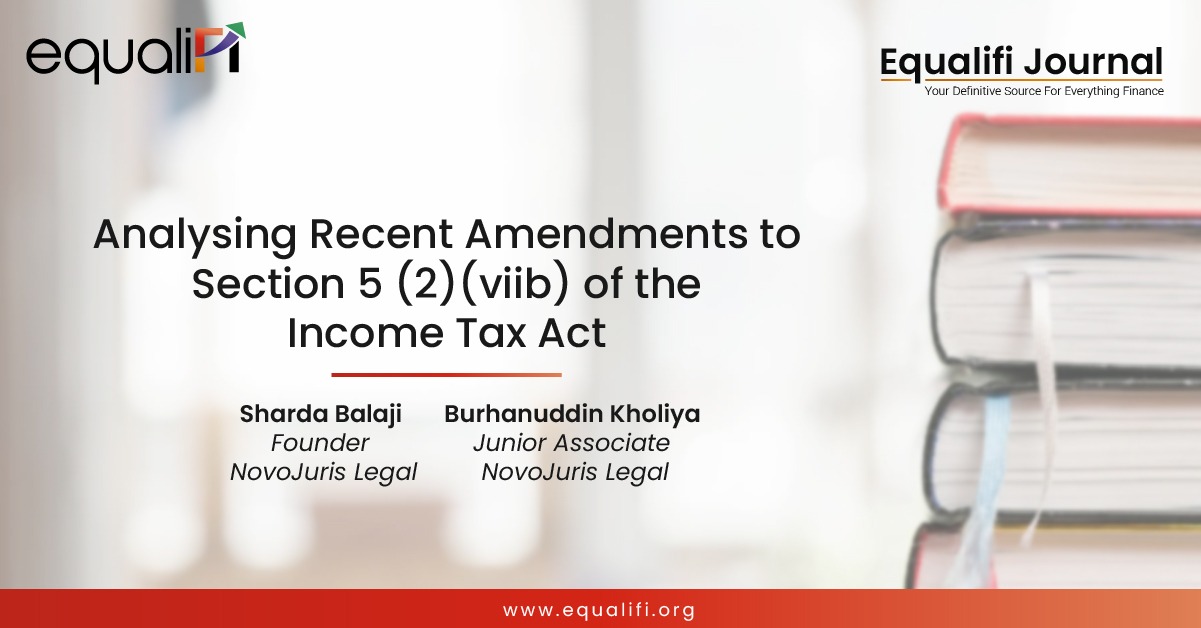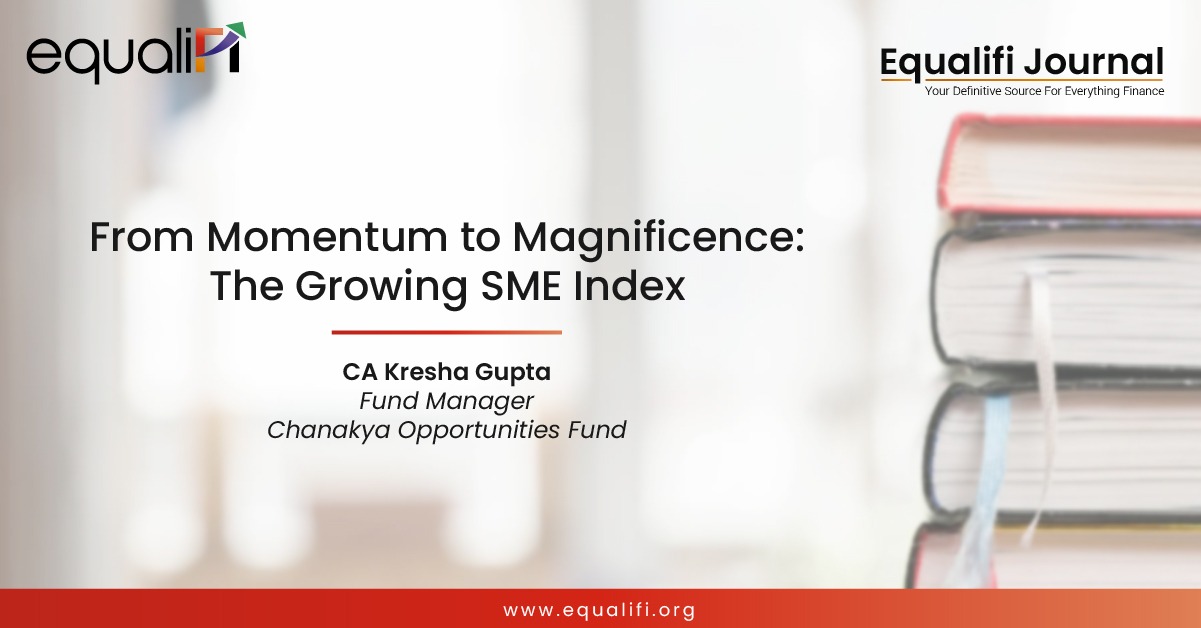Analysing Recent Amendments to Section 56(2)(viib) of the Income Tax Act: Exemption Notification and Proposed Changes to Rule 11UA
Posted on: June 5, 2023 | By: Sharda Balaji, Founder, NovoJuris Legal
Burhanuddin Kholiya, Junior Associate, NovoJuris Legal
The Finance Act of 2023 has introduced an important amendment to the Income-tax Act, 1961 (the Act). One of its amendment brings the consideration received from non-residents for the issuance of shares within scope of section 56(2)(viib) of the Act with effect from the 1st day of April, 2024. At present only consideration from residents is subject to tax under said section.
Following this amendment, the Central Board of Direct Taxes (the CBDT) has proposed changes to Rule 11UA of the Income Tax Rules (the Rules) vide its press release dated 19 May 2023 which governs the valuation of shares for the purpose of section 56(2)(viib) of the Act.
Additionally, in light of power under clause (ii) of proviso to above section, a separate notification has been issued on 24 May, 2023 specifying entities that are exempted from the provisions of this section.
In this article, we will discuss the implications of the aforementioned press release and notification.
- Angel Tax provision in brief:
Sec 56(2)(viib) of the Act (commonly known as the angel tax provision) provides that where a closely held company, receives, from a resident person, any consideration for issue of shares that exceeds the face value of such shares, then the aggregate consideration as exceeding the fair market value of the shares shall be chargeable to income-tax under the head “Income from other sources”:
Provided that this clause shall not apply where the consideration for issue of shares is received—
(i) by a venture capital undertaking from a venture capital company or a venture capital fund; or
(ii) by a company from a class or classes of persons as may be notified by the Central Government.
As per Explanation, the fair market value of the shares shall be the highest of the following value:
(i) as may be determined in accordance with such method as may be prescribed under Rule 11UA (2) of the Rules; or
(ii) as may be substantiated by the company to the satisfaction of the Assessing Officer, based on the value, on the date of issue of shares, of its assets, including intangible assets being goodwill, know-how, patents, copyrights, trademarks, licences, franchises or any other business or commercial rights of similar nature.
- Amendment to Angel Tax provision:
With effect from 1 April, 2024, if a closely held company receives consideration exceeding the face value of shares from any person, whether a resident or a Non-resident, the excess amount over the Fair Market Value of the shares will be treated as income and is chargeable to income tax under Section 56(2)(viib) of the Act also known as angel tax provision.
- Notified classes of person exempt from Section 56(2)(viib):
Pursuant to clause (ii) of first proviso to angel tax provision, the notification issued by the CBDT on May 24, 2023, provides a list of entities and countries that are exempt from tax under Section 56(2)(viib) of the Income-tax Act, 1961.
The said notification provides that investments from following shall not be taxed under section 56(2)(viib):
- Government and Government-related investors: Investments from central banks, sovereign wealth funds, international or multilateral organizations, and agencies controlled by the government etc. will not be subject to tax under Section 56(2)(viib). This exemption encourages investments from these entities and provides certainty regarding tax implications and protects the integrity of these institutes.
- Banks and entities involved in insurance business: This exemption recognizes the regulated nature of these financial institutions and their compliance with relevant laws and regulations.
- Specified entities from countries listed: The notification includes a list of countries whose specified entities, subject to applicable regulations, are exempt from angel tax provision.
The specified entities include:
- Category-I Foreign Portfolio Investors registered with the Securities and Exchange Board of India
- Endowment funds associated with universities, hospitals, or charities
- Pension funds established under foreign laws, and
- Broad-based pooled investment vehicles or funds with more than fifty investors,
excluding hedge funds or funds with complex trading strategies.
The CBDT has finalised the following list of 21 countries:
| 1. Australia | 8. France | 15. New Zealand |
| 2. Austria | 9. Germany | 16. Norway |
| 3. Belgium | 10. Iceland | 17. Russia |
| 4. Canada | 11. Israel | 18. Spain |
| 5. Czech Republic | 12. Italy | 19. Sweden |
| 6. Denmark | 13. Japan | 20. United Kingdom |
| 7. Finland | 14. Korea | 21. United States |
These countries have been identified by the CBDT as having a well-established regulatory framework that ensures transparency and legitimacy in their financial and investment systems. Thus, Investments made from specified entities of these countries will be exempt from angel tax provision.
Assessing the Impact: Investments from Listed Countries vs. Non-listed Countries:
According to the data published by the Ministry of Commerce and Industry of India on 28th July 2022, the following Nations were identified as top 5 Nations contributed to Foreign Direct Investment (FDI) equity flows into India during the fiscal year 2021-22:
| Rank | Countries | % FDI |
| 1. | Singapore | 27.01% |
| 2. | USA | 17.94% |
| 3. | Mauritius | 15.98% |
| 4. | Netherland | 7.86% |
| 5. | Switzerland | 7.31% |
| Total | 76.10% | |
Interestingly, the CBDT’s List fails to include major contributors to foreign direct investment (FDI). As a consequence, investments originating from countries including Singapore, Mauritius, the Netherlands, and Switzerland, which are not mentioned in the list, may be subject to angel tax.
This differentiation in tax treatment may influence investment decisions and the flow of capital from different countries. Investors from countries included in the list may find India more attractive due to the tax exemption. In contrast, investors from countries not covered in the list may need to consider the tax implications and factor them into their investment decisions.
It is important to note that the inclusion or exclusion of countries in the list is based on the CBDT’s assessment of the regulatory framework and is a policy choice made by the tax authorities.
- Proposed changes to Rule 11UA(2) pursuant to press release:
The proposed changes put forth by the CBDT in its Press release dated 19 May, 2023 are discussed below:
- Proposal to include five more valuation methods will be included:
Our comments: It is proposed to provide additional five methods for valuation of shares issued to Non-residents. This will provide more flexibility and options for determining the fair market value of shares. This recognizes that different valuation approaches may be appropriate or preferred for different types of investors or investment scenarios.
- Consideration to be received within 90 days:
Our comments: Where a non-resident entity provides consideration to a company in exchange for issuing shares, the price of such equity shares can be determined as the Fair Market Value (FMV) of the shares for both resident and non-resident investors.
There are two conditions or limitations mentioned in the statement:
(i). The consideration from the FMV should not exceed the aggregate consideration received from the such entity.
(ii). The consideration from such entity should be received by the company within ninety days from the date of issuing the shares.
These conditions are important for ensuring that the consideration received for the shares is in line with the fair market value and is within the specified time frame. By imposing these conditions, the authorities aim to prevent any potential misuse or manipulation in determining the valuation of shares and the corresponding consideration received from non-resident entities.
- Validity period of valuation report:
Our comments: The proposed change states that the valuation report prepared by a Merchant Banker will be considered acceptable for the purposes of this rule, as long as it is not older than ninety days prior to the date of issuing the shares that are being valued. This means that the valuation report should be relatively recent, ensuring that it reflects the current market conditions and the value of the shares at the time of issuance. Accepting a valuation report within this timeframe adds credibility to the valuation process and helps ensure the accuracy of the determined value.
- Proposed introduction of “safe harbour” provision:
Observation: The proposed change aims to address certain factors that can impact the valuation of non-listed equity shares during multiple rounds of investment.
To provide some flexibility, the proposal suggests the introduction of a safe harbor provision. This provision would allow for a 10% variation in the determined value of the shares. In other words, if the actual value of the shares exceeds up to 10% of the determined value, it will be considered acceptable and not subject to further adjustment or scrutiny.
By incorporating this safe harbor provision, the intention is to provide a reasonable margin for fluctuations in value that may occur due to external factors beyond the control of the company or the investors.
- Conclusion:
In conclusion, the amendment to the Income-tax Act, 1961, seek to ensure fair taxation and are likely set to regulate and monitor the inflow of foreign investments into the company and ensure compliance with applicable laws or regulations.
It’s important to note that these changes are proposed at the time of the press release, and they may be subject to further revisions or finalization based on stakeholder feedback and the CBDT’s review process. The ultimate implementation of the proposed changes will depend on the CBDT’s official notification or circular, which will provide detailed guidelines and instructions for applying the revised Rule 11UA.








